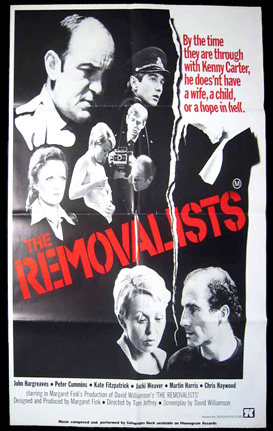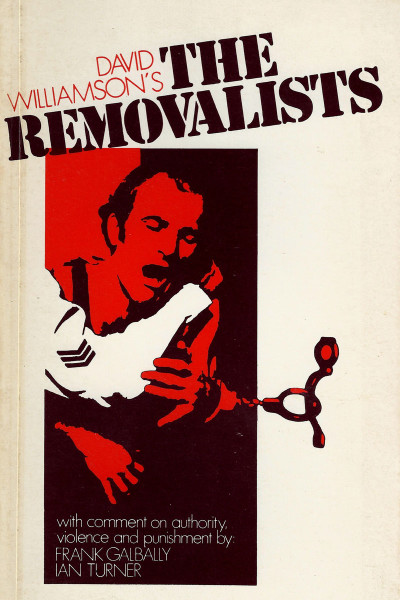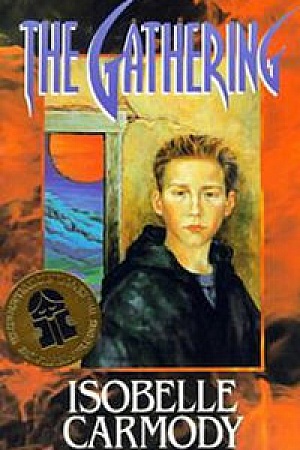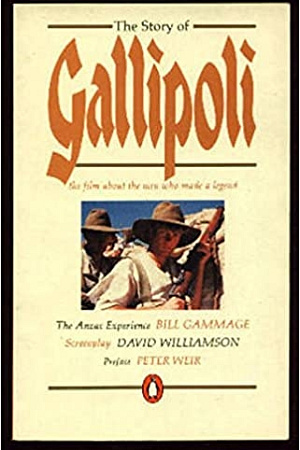Reading Australia: 'The Removalists' by David Williamson
David Williamson is our most distinguished dramatist. His plays have been performed to acclaim in Australia and internationally. His screenplays, notably Gallipoli (1981), define a certain Australian mythos. Williamson is considered an establishment playwright, depicting middle-class fears and foibles in major theatres. But he came to prominence in a different forum, with a play anything but mainstream. The Removalists, first performed in 1971, is violent, funny, and disturbing. It centres on two policemen, Ross and Simmonds. After receiving a domestic violence complaint from Fiona, they help her to move out and end up beating her husband Kenny to death.
With its brash depiction of Australian ocker culture, realist vernacular, physical brutality, and frequent profanity, The Removalists was a radical play for its time. Until the cusp of the 1970s, Australia's theatre was conservative and overwhelmingly English. As Williamson has stated, state theatre companies 'were in the hands of Englishmen who ... took their main brief to be one of educating and uplifting the beer-swilling natives'. Young playwrights like Williamson, then a lecturer in thermodynamics and social psychology, were frustrated by the focus on European plays: 'we felt there was no way we could get a representation of the life around us into our theatres.' Partly, this was due to an obdurate 'cultural cringe' that disdained Australia as vulgar. The 'New Wave' playwrights resisted this attitude, dramatising Australian life and characters – notably the foul-mouthed ocker male. This was a substantial shift, not least because swearing on-stage had been, until recently, illegal.
The new drama was facilitated by an alternative theatre scene, with Sydney's Nimrod and Melbourne's Pram Factory and La Mama as the crux. These theatres reflected a wider counter-cultural movement of hippies, Vietnam War protests, and sexual liberation. Founded by Betty Burstall, who was inspired by the experimentalism of New York's 'off-off-Broadway', La Mama was a former shirt-factory (and possible brothel) repurposed as a performance space for professional, but experimental, Australian theatre. It was starkly different to major state theatres: La Mama's audience wore jeans and sat on mismatched chairs. The Removalists was first performed there, before commercial runs in Melbourne, Sydney, London, and New York, and a 1975 filmic adaptation directed by Tom Jeffrey. It has, understandably, been called an anti-police play. Williamson has denied that the play is so simplistic (even writing an introduction and placing a note in the script). He is right.
 The Removalists film poster, 1975 (Umbrella Entertainment)The Removalists is a study of social conditioning: the way 1970s Australia pushed people into 'primitive', inflexible roles, notably through authoritarianism. Through the interpersonal conflict between Ross, Simmonds, and Kenny, the play shows how the clashes between these conditioned roles leads to the perpetration and tolerance of violence. Via the male characters' treatment of Fiona and Kate, The Removalists also skewers the chauvinism, misogyny, and domestic violence (physical and verbal) of the era's ocker culture. Williamson's sophisticated structure augments the play's critique of violence. The Removalists, like many Williamson plays, inhabits the 'borderlines' between satire and realism. It prompts the audience to relax into a comedy, then shocks us with horrific beatings. This uneasy tension between humour and savagery unsettles the audience, making us complicit in the violence and prompting us to question our own tolerance of it in society.
The Removalists film poster, 1975 (Umbrella Entertainment)The Removalists is a study of social conditioning: the way 1970s Australia pushed people into 'primitive', inflexible roles, notably through authoritarianism. Through the interpersonal conflict between Ross, Simmonds, and Kenny, the play shows how the clashes between these conditioned roles leads to the perpetration and tolerance of violence. Via the male characters' treatment of Fiona and Kate, The Removalists also skewers the chauvinism, misogyny, and domestic violence (physical and verbal) of the era's ocker culture. Williamson's sophisticated structure augments the play's critique of violence. The Removalists, like many Williamson plays, inhabits the 'borderlines' between satire and realism. It prompts the audience to relax into a comedy, then shocks us with horrific beatings. This uneasy tension between humour and savagery unsettles the audience, making us complicit in the violence and prompting us to question our own tolerance of it in society.
The Removalists begins with Constable Ross's first day. Sergeant Simmonds swiftly establishes his authority through belittlement and patronising advice. His bullying is often conveyed in crude one-liners ('If you want to go on staggering through life like a blind man in a brothel, then that's your business'). They establish the latent aggression beneath the play's comedy. This aggression is manifested when Ross defies Simmonds by refusing to reveal his father's occupation. Simmonds angrily asserts his power until Ross submits: 'Look, Ross, I'm in authority here and I'll decide what's my business ...You don't know a bloody thing.' We see that Simmonds, like any fascist, views himself, and not the law, as the source of power: 'Stuff the rule book up your arse.' Simmonds only takes cases he finds 'interesting'.
'The Removalists is a study of social conditioning'
Such a case arises when Fiona, an ingénue, and her domineering elder sister, Kate, report Kenny's domestic abuse. Kate's treatment of Fiona mirrors Simmonds's bullying of Ross, suggesting that authoritarianism pervades society, not just the police force. Kate editorialises when Fiona makes her statement; she depicts Fiona as imprudent, financially weak, and lacking sexual self-control. The first flare of authoritarian violence occurs when Simmonds abuses his power to unnecessarily inspect Fiona's bruises, 'prodding her flesh slowly and lasciviously'. Kate collaborates: Simmonds 'looks across at Kate, establishing something of a carnal conspiracy between them. Kate is gaining sensual pleasure from Simmonds' lechery.' Indeed, Kate encourages Fiona to go further – to roll up her skirt. Ross becomes a 'smug and eager' accomplice, photographing Fiona's nude flesh to prove himself to Simmonds.
Fiona's ordeal introduces the play's critique of authoritarian violence, presaging the way the characters respond to Kenny's beating: stronger characters exert power and the weaker collaborate or fail to intervene. The ordeal also shows how the female body is appropriated and objectified by the chauvinist male, something augmented by the deal agreed, sub-textually, by Simmonds and Kate: the police will help Fiona secretly move out of her abusive home, but only for sexual favours.
'Fiona's ordeal introduces the play's critique of authoritarian violence'
When Act Two begins, Fiona is packing. But Kenny comes home unexpectedly. Then the Removalist arrives. Then the police. Simmonds establishes himself as a 'big man' – a cop who 'won't tolerate ... a man with no respect for womanhood' – and beats the handcuffed Kenny when he insults Kate or Fiona. Kenny, as Williamson says, sees himself as 'a great fucker and a great fighter', intent on proving 'he's tough'. Humiliated and disempowered, Kenny retaliates verbally. He continues to insult the women and criticises Simmonds's lack of authority to beat him for rudeness: 'That badge don't allow you to do anything you like.' Having set the consequences for defiance, Simmonds beats Kenny more savagely. At first, the audience is prompted to enjoy Kenny getting a kicking for his vile, yet comic, insults: 'If roots were hamburgers,' he tells Kate, 'you could feed a bloody army.' We 'all have sadistic and aggressive impulses,' Williamson says, 'We can all empathise, to some extent, with the Sergeant beating Kenny up in the early stages, but what the play is finally saying is, "Beware of the beast within".'
That 'beast' grows stronger and violence escalates as Simmonds and Kenny continue to assert themselves as authoritarian and ocker tough guys. The conflict peaks when Kenny probes Simmonds's masculine insecurity: sexual potency. Kenny accuses Fiona of contemplating infidelity: 'Sounds like you were all set up to pay off your obligations tonight. Which one was yours? The old fossil here? ... Looks like he couldn't raise the bus fare to Balwyn.' Having emasculated Simmonds, Kenny seeks to regain Fiona with his own virility, bragging that Fiona 'came five times in the one grapple'. Simmonds 'goes berserk. It is as if Kenny's words have found the trigger to switch him from controlled to uncontrolled violence.' Badly beaten, Kenny persists: 'tell the Sergeant ... you squeal like a stuck pig for me.' Simmonds, whose wife is unable to have sex after a difficult pregnancy, is enraged by Kenny's criticism of his masculinity.
'Simmonds ... is enraged by Kenny's criticism of his masculinity'
Kenny pleads with the Removalist, Fiona, and Kate for help, but Kate countermands Fiona's weak appeals to Simmonds, and the Removalist 'can't afford to get involved, mate': he is more concerned about his expensive truck than Kenny's life. This ambivalence exemplifies the moral cowardice in society that sustains violence. After the women and Removalist leave, no one backs down and Kenny's beatings get worse. When Simmonds tries to de-escalate the situation ('He's not worth the effort'), Kenny keeps prodding: 'Piss off to your police station and crawl back into the woodwork.' Kenny now focuses on Ross: 'I've seen some cowardly fuckwits hiding behind their uniforms in my time but without doubt you're the bottom of the bloody barrel.' Ross, who wants to be seen as competent, has been ridiculed throughout the play. Like Simmonds, Ross snaps when his insecurity is targeted, beating Kenny so savagely off-stage that Ross believes him dead.
 Poster for the Stooged Theatre production, 2013As the panicked police strategise, Kenny drags himself back in. Simmonds cuts a deal: prostitutes in exchange for Kenny staying silent and not seeking damning medical treatment. As Simmonds and Kenny reconcile over a beer, Kenny dies. Now we see Simmonds's core: 'Not a vile sadistic beast,' Williamson says, 'but a puffed up toad who is a pathetic frightened little man inside.' Ross takes charge and they plan to cover up the death by faking a wild attack by Kenny. The Removalists ends with Ross and Simmonds beating each other savagely, the logical conclusion to the play's escalating violence. This 'nightmare' 'could have been avoided,' Williamson says, 'had any of the three principal characters ... been a little less constrained by their conditioning.'
Poster for the Stooged Theatre production, 2013As the panicked police strategise, Kenny drags himself back in. Simmonds cuts a deal: prostitutes in exchange for Kenny staying silent and not seeking damning medical treatment. As Simmonds and Kenny reconcile over a beer, Kenny dies. Now we see Simmonds's core: 'Not a vile sadistic beast,' Williamson says, 'but a puffed up toad who is a pathetic frightened little man inside.' Ross takes charge and they plan to cover up the death by faking a wild attack by Kenny. The Removalists ends with Ross and Simmonds beating each other savagely, the logical conclusion to the play's escalating violence. This 'nightmare' 'could have been avoided,' Williamson says, 'had any of the three principal characters ... been a little less constrained by their conditioning.'
Authoritarianism is not the only social conditioning that prompts violence. Kenny exemplifies the 'ocker lad' who is conditioned to believe that 'it is the woman's place to empty the kitchen tidy, and if she doesn't she deserves a thumping'. Kenny enters in Act Two wanting sex and a steak. 'I can't,' Fiona protests tellingly, 'I'm ironing.' Angry, Kenny asserts authority: 'Get out into the kitchen, open the fridge, get out a piece of sliced cow and put it under the griller, you lazy bitch.' Later, we learn the 'cause' of Fiona's domestic abuse: 'I'd been warning you about that kitchen tidy for two days.' Like his verbal abuse of Fiona for refusing to cook, Kenny believes it reasonable to beat his wife for neglecting a domestic 'duty'. This is reinforced by his appeal to Simmonds: 'Christ, I only gave her a shove ... How would you like a kitchen full of stinking rubbish?' Kenny's chauvinism is clear throughout. Women are sex objects with carnal obligations to their husbands, but female sexuality, expressed any other way, is considered abhorrent. Kenny describes Kate's unfaithfulness to her husband as: 'Moral ain't the right word for you, you bloody trollop ... Bangs like a buggered tappet.' This misogyny – expressed in profane Australian vernacular – is central to the ocker culture portrayed in The Removalists, and other 'New Wave' plays.
 Currency Press edition, 2010
Currency Press edition, 2010
Buy this bookHad The Removalists simply criticised police brutality with ocker male characters who swore and punched each other, it would remain an important Australian play, exemplifying the 'New Wave' shift from European to Australian stories on-stage. But its wider critique of violence – authoritarian and sexist – triggered by social conditioning, together with a sophisticated structure that leaves its audience uncomfortably tugged between realism and satire, grant it distinction. We are repeatedly prompted to laugh in proximity to violence; indeed, the play's most violent characters, Simmonds and Kenny, are its most amusing. There are moments of physical comedy and farce, exemplified by Kenny's 'second death'. As Ross and Simmonds scream at each other for killing Kenny, he drags himself back in and lights a cigarette: 'Did you two pricks think you did me?' The play's most violent moment is also its funniest. The Removalists is structured into a 'series of emotional peaks [violence], releases [comedy]' that never allow the audience to rest in one genre. During the play's first run, Brian Kiernan writes, the 'audience would be laughing one minute and stunned by Sergeant Simmonds' violence the next, some even crying. One night ... a young man rose from the audience, approached the stage and pleaded with [Simmonds] to stop beating' Kenny.
This interplay of comedy and realism produces a highly accomplished satire: the play speaks directly to its viewers by portraying recognisable Australian characters; it reveals aberrant social behaviour requiring correction; it makes us laugh, yet sickens us by drawing us into their violence; and it has wider application than the era of its creation. Both 'a celebration and criticism of Australian society', The Removalists is far more complex than a play about 1970s police brutality. It digs at the heart of our human relationship with violence. It reveals 'the beast within'.
References
Casey, Maryrose. 'Australian Drama Since 1970', A Companion to Australian Literature Since 1900 (2007), edited by Nicholas Birns and Rebecca McNeer.
Fitzpatrick, Peter. Williamson: Australian Drama Series (1987).
Kennedy, Dennis (ed). The Oxford Companion to Theatre and Performance (2010).
Kiernan, Brian. David Williamson: A Writer's Career (1996).
Sammut, Elvira. 'Sugared Placebos'? The Effects of Satire and Farce in the Plays of David Williamson, PhD Thesis, Victoria University (2008).
Tobin, Meryl. 'David Williamson: Playwright – A Profile', Westerly no. 20:2 (June 1975).
Wilde, William H., Hooton, Joy, and Andrews, Barry (eds). The Oxford Companion to Australian Literature (1994, online 2005).
Williamson, David. Collected Plays: Volume 1 (1986).
Williamson, David. 'The Removalists: A Conjunction of Limitations', Meanjin Quarterly no. 33:4, (December 1974).
Zuber-Skerritt, Ortrun (ed). Australian Playwrights: David Williamson (1988).










Leave a comment
If you are an ABR subscriber, you will need to sign in to post a comment.
If you have forgotten your sign in details, or if you receive an error message when trying to submit your comment, please email your comment (and the name of the article to which it relates) to ABR Comments. We will review your comment and, subject to approval, we will post it under your name.
Please note that all comments must be approved by ABR and comply with our Terms & Conditions.